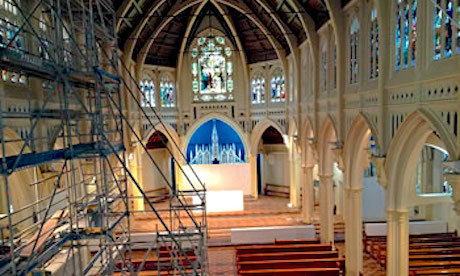The proposed legislation for managing earthquake prone buildings fails to provide a financial framework to support the owners of buildings that play a key role in defining the kind of communities that make New Zealand such a great place to live, says the Archbishop of Wellington, New Zealand, John Dew.
The Archdiocese of Wellington has made a submission on behalf of all the New Zealand dioceses to the Select Committee considering the Building (Earthquake-prone Buildings) Amendment Bill.
The Bishops fully support of the intent of the legislation which is to improve safety. However they think that more work needs to be done to analyse the impact of the proposals on all.
In a press release issued on 23 April Dew says that the owners of many of the commercial building in the CBD of main centres have good reasons to improve their buildings and many will be able to access the resources that will allow them to do so.
But, he says, Church communities do not have access to the capital needed to achieve all the improvements legislation will require within the timelines proposed. “Left to ourselves the decision is a stark and difficult one.”
“With the support of our parishioners, others in the community, and local and central government some buildings will be able to be improved.”
“Many of our communities are struggling towards achieving this now he says, but the cost is high.”
Dew says that while they the places where people gather must be safe for all, “the balance to be achieved between safety and affordability is the challenge we are currently faced with and the one this Bill attempts to address.”
“The challenge is not black and white or easy. It is not about choosing between one priority and another.”
“Funds to improve our buildings will have to be specifically raised from our communities. Many of our communities cannot even afford the increased insurance costs on their buildings following the Canterbury events.”
“The reality is that there are competing demands and massive need. Church communities that are most likely to be affected by the Bill are small parishes who have an asset in the form of a building but lack the necessary cash-flow to maintain them, let alone support the activities that are the very reason for their existence,” Dew says.
He says they look forward to being part of society’s wider conversation. As a society we need to ask the following:
- How do we understand risk and safety without it becoming a matter of mere compliance with a legal minimum?
- Does this legislation provide building owners who comply with protection from other legislation where an incident is earthquake related?
- Has government itself found the balance in the way it manages its own buildings and tenancies on our behalf?
- What other assistance can government (central and local) provide to those without the commercial, capital, and taxation levers to respond to the new and increasing demands?
- Should legislation provide more clarity about the policy intent and avoid phrases with multiple meanings like “earthquake prone” so that people understand the issues without it all being left to the technicalities of regulation, code, and standard?
- Have analysts fairly examined the true cost of this legislation for owners that do not have the benefit of cash-flow related to building ownership?
- Has enough care been taken to understand the impact of the provision of initial assessments by councils, when the cost of detailed assessment is beyond the reach of many?
- Should all buildings be required to display notices outlining their seismic status?
- Has the wider social impact of seismic activity been considered? “We have made a submission to the Select Committee considering this Bill.
Source
- Supplied by The New Zealand Catholic Bishop’s Conference
- Image: Marist Messenger
